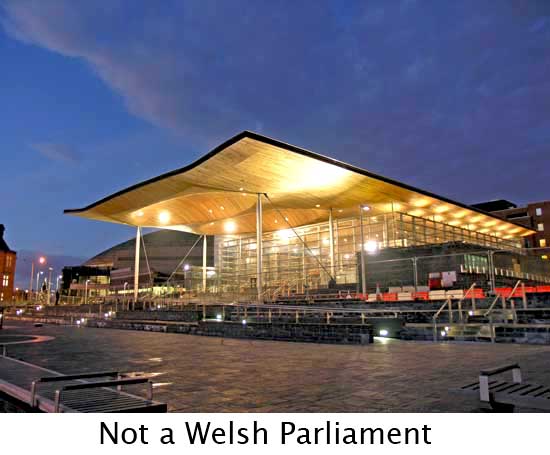If you scroll down my sidebar you’ll see that, under ‘Jac’s Reads’, one of the blogs I follow is Wales Eye, written by Daran Hill, managing director of Positif, a political lobbying firm in Cardiff docks and an integral part of the self-important but ultimately impotent Cardiff bubble. Don’t think I’m being nasty to Daran Hill, I don’t know the man; to the best of my knowledge our paths have never crossed. But today he posted a piece that made me think, ‘Why doesn’t he get it?’
The information for the piece I’m referring to had probably been fed to him by disgruntled BBC journos. It seems that Edwina Hart, the minister for Economy, Science and Transport does not give live interviews, everything must be pre-recorded. The piece on Wales Eye contained much harrumphing about ‘democracy’ and ‘accountabilty’ but none of those expressing their concerns to Hill understood the real reason for Hart not giving live interviews – the truth is, sh e doesn’t know what she’s talking about. And she’s not the only one. Let me explain.
e doesn’t know what she’s talking about. And she’s not the only one. Let me explain.
Back in January I posted this, about a statement made by Alun Davies, at the time Minister for Natural Resources and Food, trying to explain why he was taking money from Welsh farmers and transferring it to ‘rural development projects’, i.e. subsidising good-lifers, hippies, Greens and others Wales would be better off without. Here’s a link to the excruciating footage of a squirming, stuttering, Alun Davies telling us why he has decided to do this. (Skip past DET’s intro to 2:03.) The thing to note here is the two civil servants flanking Davies, like prison officers with the defendant in the dock, making sure chummy don’t do nuffin stupid.
After watching Davies’s performance I gave him the benefit of the doubt by thinking that he didn’t believe what he was saying, or that he may not even have understood the full implications of what he was saying, and that he was simply repeating, parrot-fashion, what someone had told him to say. The civil servants were there to make sure he didn’t succumb to a debilitating attack of conscience or patriotism that might have rendered him unuseable.
In short, he was no more than a ventriloquist’s dummy, and the same applies to other ‘ministers’ in the absurdly named ‘Welsh Government’. This is why Edwina Hart doesn’t give live interviews – it’s because she can only repeat what she’s been told to say in a recording that can be re-started when she fluffs her lines. Because, obviously, live interviews run the risk of her being asked questions she cannot answer about policies she had no part in formulating.
 The piece in Wales Eye was prompted by Hart’s announcement of the Newport by-pass, welcomed by very few in Wales (none that I can see outside of Cardiff). The clue to Hart’s camera shyness is that chancellor George Osborne has been consistently urging the ‘Welsh Goverment’ to improve the M4: here on November 29, 2011; April 3, 2013; March 19, 2014 (and there have been other occasions). Make no mistake, this was a decision taken in London; but rather than have London fund it, the ‘Welsh Government’ was given new powers to get into debt! Once the details were worked out the scheme was passed on to civil servants in Wales, who then coached Hart in her delivery. Result: Wales will get at least £1bn into debt, other projects around the country will be shelved, and all to facilitate the flow of English goods into Wales. Wasn’t that good of Mr Cameron and Mr Osborne, children?
The piece in Wales Eye was prompted by Hart’s announcement of the Newport by-pass, welcomed by very few in Wales (none that I can see outside of Cardiff). The clue to Hart’s camera shyness is that chancellor George Osborne has been consistently urging the ‘Welsh Goverment’ to improve the M4: here on November 29, 2011; April 3, 2013; March 19, 2014 (and there have been other occasions). Make no mistake, this was a decision taken in London; but rather than have London fund it, the ‘Welsh Government’ was given new powers to get into debt! Once the details were worked out the scheme was passed on to civil servants in Wales, who then coached Hart in her delivery. Result: Wales will get at least £1bn into debt, other projects around the country will be shelved, and all to facilitate the flow of English goods into Wales. Wasn’t that good of Mr Cameron and Mr Osborne, children?
Because believe me, that’s what will happen. Improved communications mean that ‘peripheral’ areas can be served and supplied from further away. Always. Take the example of the A55 in the north. Great benefits were promised from this ‘Highway of Opportunity’ by Wyn Roberts et al, but one of the first changes to materialise was the Post Office transferring its sorting office from Bangor to Chester. And the PO was not alone. Once the M4 is improved, depots serving the south from Cardiff and Newport will start to be lost because, for example, if south Wales and the west of England can both be supplied from its Avonmouth depot then Tesco won’t keep its depot in Magor open. In a colonial economy such as Wales, where the overwhelming majority of retailers, utilities, major contractors, financial services, etc., etc., are headquartered in England, improved communications always means job losses. So we are paying £1bn for the economic benefit of England! Welcome to devolved government, ‘Welsh solutions for Welsh problems’.
The bigger problem, as I’ve hinted above, is civil servants operating in Wales but taking orders from London. I have dealt with this in countless posts, often when I write about planning and housing. I remind people that, despite a cupboard in Cardiff, the Planning Inspectorate is an executive agency of the Department for Communities and Local Government in London. The ‘Welsh Government’s own StatsWales also answers to the DCLG. The housing directorates that control social housing and other areas are also subject to the DCLG. They have a presence in Wales, and a ‘relationship’ with Welsh ministers, but it’s a ventriloquist and dummy relationship. This is why Carl Sargeant always looks out of his depth when dealing with LDPs, because just like Edwina Hart he has difficulty remembering details about policies and decisions he had no hand in determining.
It also helps explain why the EU funding has been squandered. In the south it has been wasted on professional grant-chasers, invariably English, who, instead of combating poverty and deprivation, have celebrated it, made a political and social cause of it, in order to secure funding and careers for themselves. As for those they are supposed to be helping . . . well, they’re only a bunch of losers anyway! In the west and the north the EU funding has been used to subsidise the same people who will benefit from the announcement made by Alun Davies back in January. That’s because the complete colonisation of rural Wales faces one last obstacle – too much land is still owned by the natives, farmers and the like. So fund the good-lifers and the Greens to buy land for fluffy environmental projects, protect our countryside from nasty over-grazing (i.e. farming), and let’s turn rural and coastal Wales into a land fit for the jodhpured heroes of the English middle class, escaping those frightful, multi-racial cities.
All of which makes devolution the biggest load of old bollocks in Welsh political history. We had less interference from London back in the 1950s before we had a Welsh Office or a Secretary of State than we have today, fifteen years into devolution. Because back then we were considered no threat and so we were just left to get on with things. That all changed in the 1960s, as did London’s attitude towards us. The long term policy decided upon was colonisation leading to assimilation. Devolution is just another stage in that process. We have the delusion of a ‘government’ in Cardiff, but the big decisions are taken in London. All part of the wider strategy for Wales: turn Cardiff into one of the more agreeable English provincial cities; allow the north east to merge into England’s north west; oversee the managed decline of the rest of the south (west and north of Cardiff); use rural and coastal Wales as retirement and recreation areas for England.
And that’s why Edwina Hart doesn’t give live interviews – because she’s just a ventriloquist’s dummy. But maybe no more a dummy than those who think this M4 project is good for Wales. Or those who can’t see what’s being done to this country.




